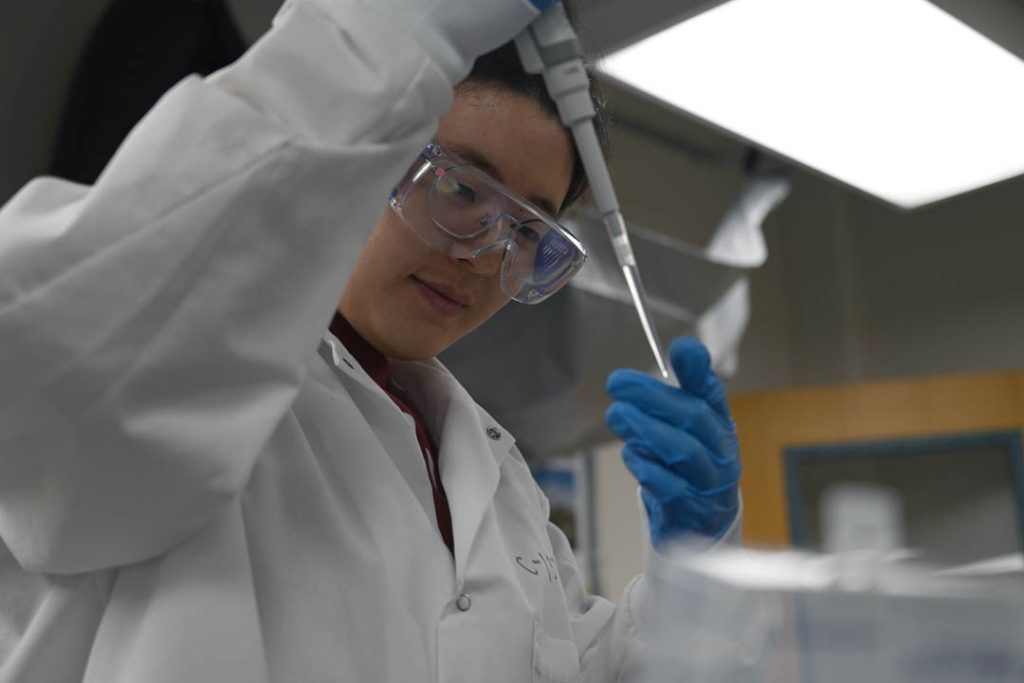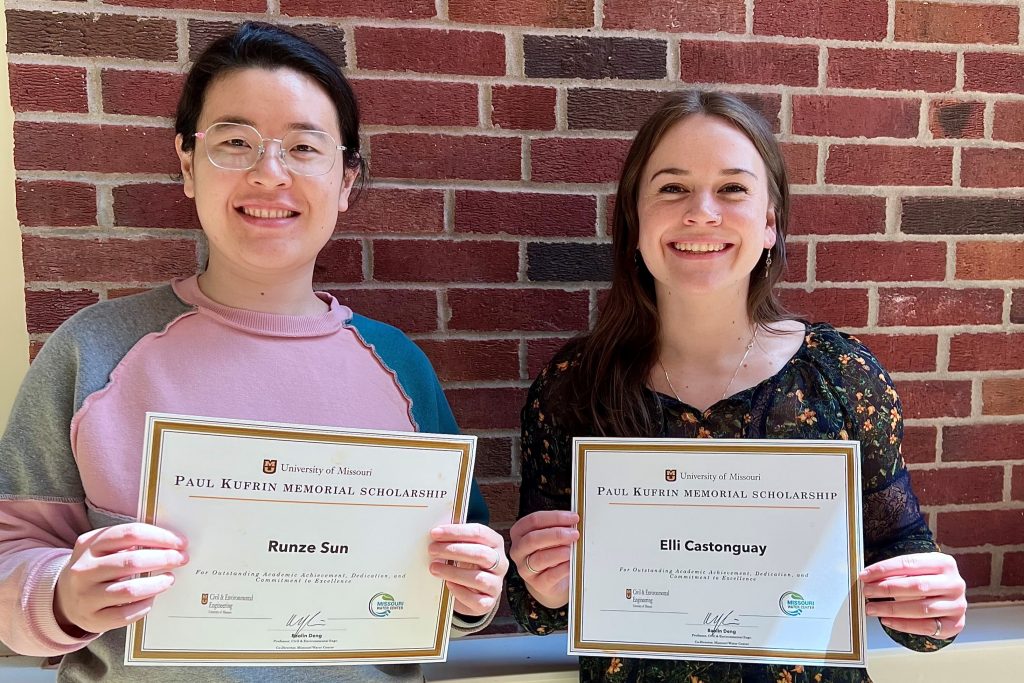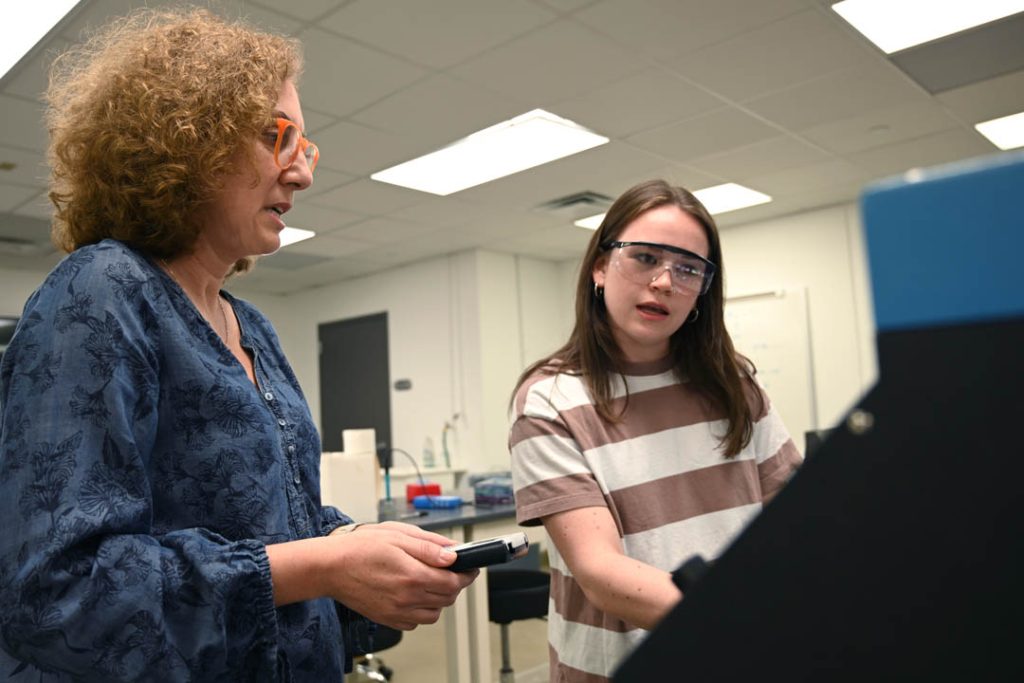May 13, 2024

Graduate students at Mizzou are adventurous and inquisitive, driven by the quest to discover the unknown. They dive headfirst into finding solutions to some of the world’s most pressing problems.
Two civil engineering graduate students are diving into the world of clean water, and recently received scholarships from the Missouri Water Center to continue their research. Elli Castonguay, a master’s student, is looking into remediation methods for mining pollution in southern Missouri. Runze Sun, a Ph.D. student, is researching how to remove pre- and poly-fluoroalkyls (PFAS), or “forever chemicals” from water.
Are forever chemicals forever?
“PFAS are spread in every corner of our lives,” Sun said. “People know about them because of how hard they are to degrade, how they stay around forever, but there are some methods that can degrade these chemicals, thermal treatments and chemical oxidant treatments, into more toxic compounds.”
Her work involves first researching the potential of the more toxic PFASs that would be formed in the drinking water treatment process. Then, she is looking at how to remove them using technology currently in use in drinking water treatment plants.
Sun says that while the paper is still under revision, the preliminary results of her study are promising.
“Our test is also able to detect which type of toxic compound is generated through the degradation process as well as how many were generated,” Sun said.
Her research is also focused on implementing the technology in drinking water treatment plants. Sun’s experiments include testing drinking water treatment processes in lab situations to simulate real and practical methods used in most U.S. drinking water facilities, such as coagulation, flocculation, and disinfection.

The work requires specialized equipment that Sun is able to access through Feng “Frank” Xiao’s research group, housed within the Missouri Water Center.
“My work strives to help us build more regulations to improve the safety of drinking water,” she said. “I was so excited to be awarded the Paul Kufrin Memorial Scholarship. When Baolin Deng, co-director of the Missouri Water Center, told me I received the award I couldn’t believe it. I would like to thank the Kufrin family for this opportunity. We are focused on pursuing this research that will have a positive impact on guarding the safety of drinking water for the country and the world.”
Reversing historic pollution with beverage production byproducts
Castonguay, a Missouri native, became interested in her current project after learning about the state’s mining history. Lead and zinc were mined extensively in the Joplin, Missouri, area for over 100 years. This activity led to heavy metals dissolving into the groundwater and traveling across the region, threatening both ecosystem and human health.
Her research uses sulfate-reducing bacteria, which are native to the region, to reduce heavy metal pollution present in water. The bacteria transform the heavy metals into solid forms which can then be removed, thus minimizing the transport of metals throughout the environment and mitigating risks of exposure. However, the issue is that the ability of bacteria to perform this remediation is limited by the amount of usable carbon available in the system.
“In order to increase the amount of carbon in the water, I’m using brewers’ spent grain, a by-product of beer production, and evaluating its potential to be a food source for the sulfate-reducing bacteria,” Castonguay said. “The idea is to reuse this waste product to promote a more circular economy and provide a sustainable remediation method for communities which have historically been impacted by widespread contamination.”

If her research shows that this product would serve as a good carbon source for sulfate-reducing bacteria, Castonguay says that clean-up is possible through multiple applications. These applications could include adding the spent grain to wastewater treatment facilities, in bioremediation ponds within the field, or by putting the brewers’ spent grain in mesh bags and placing them directly in the contaminated water for a low maintenance option.
“I did three semesters of research in undergrad at Mizzou,” Castonguay said. “At that time, I was interested characterizing the carbon in mining areas—what type, how much of it was present and its interactions in the environment. Now that we know more about the conditions present, my current research is motivated by how we can more effectively remediate the problem.”
Castonguay says that receiving the scholarship has inspired her in her work and in wanting to do the same for other students in the future.
“There’s a lot of pollution in Missouri from mining, so there is a need for trying to find more cost effective and sustainable ways to remove it,” she said. “It was such an honor to receive the scholarship, there are so many students here doing great work. It’s not only an investment in my work, but it is also an investment into the environment and pollution remediation.”
Pursue meaningful research that can change our global communities. Choose Mizzou Engineering!